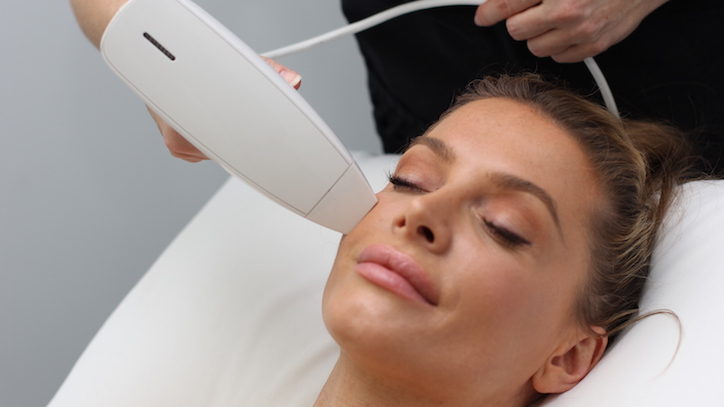




Google the pros and cons of laser skin resurfacing treatments and…welcome to the rabbit hole! While it’s best to know all the options before leaping into any treatment plan, it’s easy to become overwhelmed. It’s best to go in informed, but instead of getting bogged down with specific details, start with these seven simple must-know facts to help you find the best skin resurfacing treatment plan for you.
The information available out there for skin resurfacing treatments can vary depending on the source, but keeping an eye on one’s top aesthetic goals will help narrow down the options. Skin resurfacing treatments can be used to improve the appearance of deep wrinkles, uneven skin texture, pigmentation spots, stretch marks, rosacea, enlarged pores, acne scars, or other scars—no matter the need, there’s a treatment out there for that. As well, treatments may vary based on body part and other factors, so be sure to have a clear picture of the target outcome and ideal way to get there. A certified treatment provider can help narrow down the rest.
All the names of devices and treatment types can get a little confusing, so it may be best to consider treatment categories by technology type instead:
While the last two options offer a faster recovery time, a treatment plan (rather than a single session) is often required for best results.
Some skin resurfacing treatments run a risk of scarring or causing further pigmentation spots in some skin types and tones. For the most part, those with sensitive skin will want to avoid CO2 laser treatments, chemical peels, and microdermabrasion. IPL and radio frequency treatments may offer a more comfortable alternative. As for skin tone, for those with darker skin, radio frequency treatments are generally the best bet. Before taking the plunge on any treatment though, be sure to seek out the opinion of an experienced, certified skin resurfacing treatment provider.
We’re not talking research here (although it’s a good start)—we’re talking about proper skin prep. While preparation tips will vary by procedure, it’s best to avoid tanning at least two weeks prior to the first treatment. Shaving the treatment area may be necessary. As well, treatment providers may recommend a specialized skin care routine prior to the first treatment and between treatments to improve overall results.
These aren’t fix-it-and-forget-it treatments. Similar to treatment prep, post-treatment care will post-treatment care can greatly affect the overall outcome. The treatment provider will often have a list of tips for ensuring a speedy recovery and the best results, so be sure to pay attention and follow their guidelines. Ask any and all questions that may arise in terms of skin care, exercise, or other lifestyle factors. A minimum of 24 hours free of exposing the skin to makeup, lotions, water, sweat, heat, and tanning can be expected—though, again, this will vary by treatment and may be extended for options that remove the surface layer of the skin (i.e. CO2 laser, chemical peels, microdermabrasion).
Lifestyle factors and medications can impact the results of many skin resurfacing treatments. Smoking can affect recovery time, since nicotine impedes healing by restricting blood flow and the movement of oxygen to the treated skin cells. Likewise, acne treatment medications that contain the ingredient isotretinoin (Accutane) can affect results and possibly even lead to scarring. A qualified treatment provider will know many of the questions to ask, but it may be a good idea to make a list of medications and supplements taken, as well as common lifestyle habits (i.e. smoking, drinking, tanning, or even exercising) to ensure nothing is missed.
We’ve been nailing this one in for most of the article, but a qualified provider really is the best resource. While a friend, colleague, or beauty blogger may swear by a particular treatment, it’s best to seek a customized consultation. There certainly isn’t a one-size-fits-all approach to aesthetics, and a certified aesthetics expert will be able to narrow down the best skin resurfacing options for individual skin type, skin tone, and aesthetic goals.
Begin your research into a customized radio frequency skin resurfacing treatment plan today by locating a certified provider near you.
Find a certified Venus Treatments provider near you today who specializes in today’s top aesthetic medical solutions.



Search below to find a provider near you and to learn about our non-surgical aesthetic treatments with ARTAS®, NeoGraft®, Venus Bliss™, Venus Versa™, Venus Legacy™, Venus Velocity™, Venus Viva™ MD, Venus Freeze Plus™, and Venus Glow™.
For more information call: +61 416 022 096 // [email protected] // Suite 3.06/ Level 3 20 Rodbourgh Road, Frenchs Forest NSW 2086, Australia
REGULATORY CLEARANCES [ More ]
Venus Versa™ has CE Mark as a multi-application device intended to be used in aesthetic and cosmetic procedures. The SR515 and SR580 applicators have CE Mark for the treatment of benign pigmented epidermal and cutaneous lesions and treatment of benign cutaneous vascular lesions. The HR650/HR650XL and HR690/HR690XL applicators have CE Mark for the removal of unwanted hair and to effect stable long-term or permanent hair reduction for Fitzpatrick skin types I-IV. The AC Dual applicator has CE Mark for the treatment of acne vulgaris. The DiamondPolar™ applicator has CE Mark for non-invasive treatment of moderate to severe facial wrinkles and rhytides on females with Fitzpatrick skin types I-IV. The OctiPolar™ applicator on the Venus Versa™ system has CE Mark for temporary body contouring via skin tightening, circumferential reduction, and cellulite reduction. The NanoFractional RF™ (Viva) applicator has CE Mark for dermatological procedures requiring ablation and resurfacing of the skin.
NeoGraft® 2.0 has CE Mark and TGA with indication for use in suction-assisted follicular extraction and re-implantation for males and females.
The ARTAS iX™ from Restoration Robotics® is indicated for harvesting hair follicles from the scalp in men diagnosed with androgenic alopecia (male pattern hair loss) who have black or brown straight hair. The ARTAS iX™ from Restoration Robotics® is intended to assist physicians in identifying and extracting hair follicular units from the scalp during hair transplantation; creating recipient sites; and implanting harvested hair follicles.
Venus Epileve™ has CE Mark for hair removal, permanent hair reduction (defined as the long-term stable reduction in the number of hairs re-growing when measured at 6, 9 and 12 months after the completion of a treatment regimen), and the treatment of pseudofolliculitis barbae for all Fitzpatrick skin types. Venus Epileve™ is also CE-Marked for hirsutism.
Venus Legacy™ has CE Mark for the temporary increase of skin tightening, circumferential reduction, cellulite reduction, and wrinkle reduction.
Venus Velocity™ has CE Mark for hair removal, permanent hair reduction (defined as the long-term stable reduction in the number of hairs re-growing when measured at 6, 9 and 12 months after the completion of a treatment regimen), and the treatment of pseudofolliculitis barbae for all Fitzpatrick skin types.
Venus Viva™ has CE Mark for the use in dermatologic and general surgical procedures requiring ablation and resurfacing of the skin, and the treatment of moderate to severe facial wrinkles and rhytides in Fitzpatrick skin types I-IV with the DiamondPolar™ applicator.
Venus Freeze Plus™ has CE Mark for treatment of moderate to severe facial wrinkles and rhytides using the DiamondPolar™ applicator, and CE Mark for the treatment of cellulite reduction, increase of skin tightening, and temporary circumferential reduction on the OctiPolar™ applicator.
Venus Freeze™ has CE Mark for treatment of moderate to severe facial wrinkles and rhytides using the DiamondPolar™ applicator, and CE Mark for the treatment of cellulite reduction, increase of skin tightening, and temporary circumferential reduction on the OctiPolar™ applicator.
Venus Glow™ provides a dermal rejuvenation treatment that works to open up and deep-clean pores. Venus Concept is the exclusive distributor for Venus Glow™.
Copyright © 2023 Venus Concept. All rights reserved.
You are entering our website. For other country/regions and language options, please click the button below.
Click HereAre you a physician or aesthetician? Please visit our medical and aesthetic professional website to learn more.
Click Here